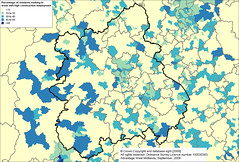
With modern criminal record systems being so easily accessed by employers, more and more of them are conducting criminal record checks as part of their pre-employment screening practices.
Employment is probably the single largest reason why getting a Canadian pardon for your criminal record is so important. Whether or not your criminal record affects your employment search, or your current job, depends on the job and on your location.
Human Rights Legislation
Human Rights Legislation, Federal and some Provincial, provide protection against most discrimination based on your criminal record. So, the first thing you need to know before you answer an employment application question about your criminal record is whether or not the employer has the right to ask in the first place. Various Human Rights Acts prohibit employers from requesting job applicants from disclosing if they have a criminal record, depending on the circumstances of employment.
If you have a criminal record, and you are looking to apply for a job or position, find out whether the company or organization is federal or provincial, and then review the following list:
Federal – Protection for pardon records, no protection for unpardoned records
Alberta – No protection
British Columbia – Protection for both pardoned and unpardoned records
Manitoba – No protection
New Brunswick – No protection
Newfoundland and Labrador – No protection
Nova Scotia – No protection
Ontario – Protection for pardon records, no protection for unpardoned records
Prince Edward Island – Protection for criminal records
Quebec – Protection for both pardoned and unpardoned records
Saskatchewan – No protection
North West Territories – Protection for pardon records, no protection for unpardoned records
Yukon – Protection for criminal records
Nunavut – Protection for pardon records, no protection for unpardoned records
Under the Criminal Records Act, federal government employment departments cannot ask questions that could expose a conviction for which a pardon has been granted. If a federal employer wishes to obtain information about a person’s criminal record history, the question should be phrased: “Have you ever been convicted of an offence for which you have not received a pardon?”
In this case a pardoned individual can answer “No.” If you do not have a pardon, however, you will need to obtain one before you apply, or you will almost certainly be turned down for the position.
If your potential or current employer falls under provincial legislation, you will have to check whether your province has protection in place for pardoned, and in some cases, even unpardoned criminal records.
Bona Fide Occupational Requirements (BFOR)
Despite all the human rights protection in place in Canada, many employers still screen for criminal records. In many cases, employers may ask for a criminal record check if they have established that it is a Bona Fide Occupational Requirement (BFOR), defined as a justifiable reason for discrimination based on a business necessity. If screening for a criminal records is required for the safe and efficient operation of the organization, or a requirement that can be clearly defended as intrinsically required by the tasks an employee is expected to perform, then they can lawfully inquire about your criminal past.
Some of the most common BFOR reasons used to conduct criminal record checks include:
Requirement to be bonded Required to work on a secured job-site Employee theft prevention Required to work with/for vulnerable persons Required to travel internationally/cross borders.
Common industries which require Pardons:
Construction on secure jobsites, law enforcement and corrections, legal, any job involving cashiers and cash handling, financial, banking and insurance, accounting, medical and nursing, dental and dental assistance, volunteering and social work, veterinarian, port and marine, airport and borders.
Backdoor Criminal Record Checks – The Job Never Offered
Many businesses conduct criminal record checks through third parties as part of their pre-employment screening practices. Usually, the applicant will sign an application for employment which includes authorization to conduct a background check. The employer will then hand off the file to a third party who conducts the criminal record check and reports the results exclusively to the employer. It is then the employer’s option whether to disclose the results of the check to the potential candidate.
A lot of times, to avoid potential liability, the employer will simply not call the candidate back for a second interview. You will not even know that your criminal record was the reason you were not considered further for the position.
The Good News – A Canadian Pardon
A criminal record that has been successfully pardoned CANNOT be accessed by any employer, even in provinces that do not offer protection for discrimination based on pardoned or unpardoned criminal records.
Once you have been pardoned, your criminal record will not turn up in a criminal record check, plain and simple. Even police will no longer have access to your criminal record. If you are interested in a Canadian pardon and would like more information, then visit www.ExpressPardons.com today.
Jared Church is RCMP accredited, a voting member of the Paralegal Society of Canada, and a leading expert in the field of Canadian Pardons, U.S. Entry Waivers, criminal record systems, and similar legal matters in Canada.
Feel free to Email Jared your questions at info@ExpressPardons.com
For more information on the author’s firm, visit www.ExpressPardons.com
Image taken on 2009-09-30 00:00:44. Image Source. (Used with permission)
Related posts:
- In pre employment background check, do employer try to reach HR to verify employment history?
- Can a new employer check my employment history through tax?
- How much is an unemployment check? There will be more job cuts at my place of employment?
- Unemployment And Redundancy Reach Record Levels
- How to write a great Resume for the Canadian Job Market
